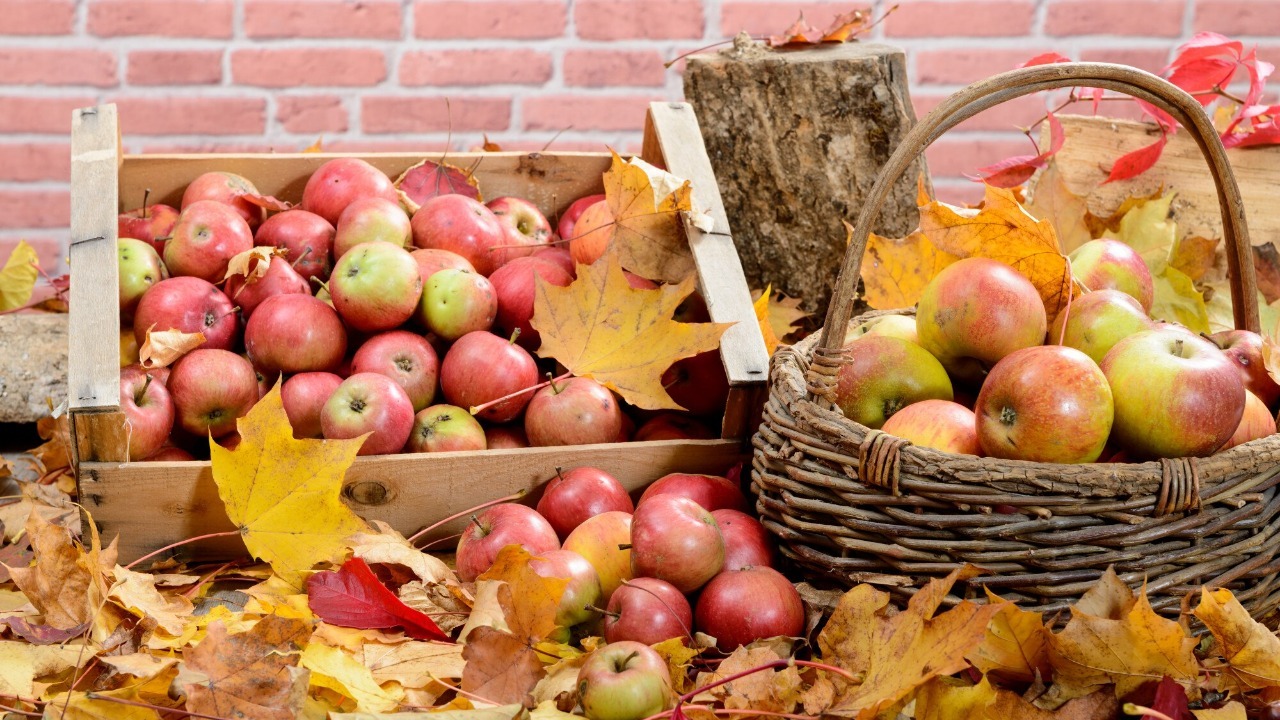Fall is a fantastic time to enjoy the bounty of seasonal produce that becomes both abundant and affordable. As the leaves turn and the temperatures drop, markets overflow with fresh fruits and vegetables that are perfect for hearty meals and festive gatherings. Embracing these seasonal gems not only enhances your culinary experiences but also supports local farmers and sustainability.
1. Apples

The crisp and juicy apple is synonymous with fall. From sweet varieties like Honeycrisp to tart Granny Smiths, apples are perfect for snacking or baking into pies. During autumn, apple orchards are bustling with activity, offering an opportunity to pick your own or purchase directly from the source. Due to their abundance, prices tend to drop, making them an economical addition to your grocery list. Additionally, apples are rich in fiber and vitamin C, contributing to a healthy diet during the colder months.
2. Pumpkins

Pumpkins are the quintessential fall produce, gracing everything from our decorations to our dishes. While best known for carving during Halloween, pumpkins are also a versatile ingredient in the kitchen. Their sweet, earthy flavor works well in soups, pies, and even risottos. As fall progresses, pumpkins become more affordable, making them a budget-friendly staple. Not only are they delicious, but they’re also packed with nutrients like vitamin A and antioxidants.
3. Butternut Squash

With its nutty flavor and creamy texture, butternut squash is a favorite for fall cooking. It’s ideal for roasting, blending into soups, or adding to hearty stews. As the season progresses, butternut squash becomes more plentiful, often leading to lower prices. Its rich content of vitamins A and C makes it a nutritious choice for your fall menu. Plus, it stores well, allowing you to buy in bulk and enjoy throughout the season.
4. Sweet Potatoes

Sweet potatoes are a fall staple, prized for their natural sweetness and versatility. They can be roasted, mashed, or even turned into fries. Their affordability increases in autumn as they are harvested in abundance. Sweet potatoes are not only delicious but also packed with vitamins and minerals, including vitamin A and potassium, making them a nutritious addition to your diet.
5. Pears

Pears reach their peak in the fall, offering a juicy and flavorful fruit option that is perfect for both eating fresh and cooking. Varieties like Bosc and Bartlett become more available and cost-effective during this season. Pears are rich in dietary fiber and vitamin C, supporting your health as the temperatures drop. They are also a delightful addition to salads, desserts, or cheese boards.
6. Cranberries

Cranberries are a fall favorite, especially as the holiday season approaches. These tart berries are perfect for making sauces, relishes, and baked goods. While they are often associated with Thanksgiving, cranberries are available throughout the fall and are generally inexpensive when bought fresh or frozen. They are known for their high antioxidant content, making them a healthy choice for boosting your immune system.
7. Brussels Sprouts

Brussels sprouts often get a bad rap, but when prepared correctly, they are a delicious and nutritious fall vegetable. Roasting them brings out their natural sweetness and makes for a perfect side dish. As they become more abundant in the fall, prices tend to decrease, making them a cost-effective choice. Brussels sprouts are a great source of vitamin K and vitamin C, supporting bone health and immunity.
8. Cauliflower

Cauliflower is a versatile vegetable that comes into its own in the fall. It can be roasted, mashed, or even used as a low-carb substitute for rice or pizza crust. As the temperatures drop, cauliflower becomes more plentiful, leading to lower prices. This cruciferous vegetable is rich in vitamins C and K and offers a good amount of fiber, making it a healthy addition to your fall meals.
9. Turnips

Turnips are a lesser-known fall vegetable that deserves more attention. With a slightly peppery flavor, they are excellent when roasted or added to soups and stews. Turnips become more affordable in the fall as they are harvested in abundance. They are rich in vitamin C and fiber, making them a nutritious choice for boosting your immunity and digestive health.
10. Beets

Beets are a vibrant and flavorful root vegetable that shines in the fall. They can be roasted, pickled, or used in salads, adding a pop of color and earthy sweetness to your dishes. As fall progresses, beets become more affordable, making them an economical addition to your meals. They are packed with essential nutrients like folate, manganese, and iron, supporting overall health and wellness.
11. Kale

Kale is a hardy leafy green that thrives in cooler temperatures, making it a fall favorite. Whether used in salads, soups, or smoothies, kale is a versatile and nutritious ingredient. It becomes more plentiful and affordable as the season progresses. Kale is rich in vitamins A, C, and K, as well as antioxidants, making it a powerhouse for your health and well-being.
12. Broccoli

Broccoli is a versatile vegetable that reaches its peak in the fall. It can be steamed, roasted, or added to stir-fries, offering a delicious and nutrient-dense addition to your meals. As the harvest season brings more broccoli to the market, prices tend to decrease, making it an economical choice. Broccoli is high in vitamins C and K, as well as fiber, supporting your immune system and digestive health.
13. Persimmons

Persimmons are a sweet and unique fruit that becomes more available in the fall. They can be eaten fresh or used in baked goods and salads. As the season progresses, persimmons become more affordable, offering a delightful and exotic addition to your fruit bowl. They are rich in vitamins A and C, providing a healthy boost to your diet during the fall months.
14. Pomegranates

Pomegranates are a jewel-like fruit that becomes more abundant in the fall. They are known for their sweet-tart flavor and vibrant seeds, which can be used in salads, desserts, or as a garnish. As pomegranates become more plentiful, they are often more affordable during the fall. They are rich in antioxidants and vitamin C, supporting your immune system and overall health.
15. Figs

Figs are a luscious fruit that ripens in the fall, offering a sweet and flavorful treat. They can be enjoyed fresh, dried, or used in baking and cooking. As the fall harvest brings more figs to the market, prices tend to drop, making them a cost-effective indulgence. Figs are a good source of fiber and essential minerals like potassium and calcium, supporting heart health and bone strength.
16. Grapes

Grapes are a delightful fruit that reaches its peak in the fall. They are perfect for snacking, adding to salads, or even making homemade jams and jellies. As the harvest season brings more grapes to the market, prices often decrease, making them an economical choice. Grapes are rich in antioxidants and vitamins C and K, promoting heart health and overall wellness.
17. Carrots

Carrots are a staple vegetable that thrives in the fall. They can be enjoyed raw, roasted, or used in soups and stews. As the season progresses, carrots become more plentiful and affordable, making them a cost-effective addition to your meals. Carrots are rich in beta-carotene, vitamin K, and fiber, supporting eye health and digestion.
18. Leeks

Leeks are a member of the onion family that becomes more abundant in the fall. They add a mild, sweet flavor to soups, stews, and casseroles. As leeks become more plentiful, prices tend to decrease, making them an economical choice for your fall cooking. Leeks are rich in vitamins A and K, as well as antioxidants, supporting your overall health and wellness.
As a mom of three busy boys, I know how chaotic life can get — but I’ve learned that it’s possible to create a beautiful, cozy home even with kids running around. That’s why I started Cultivated Comfort — to share practical tips, simple systems, and a little encouragement for parents like me who want to make their home feel warm, inviting, and effortlessly stylish. Whether it’s managing toy chaos, streamlining everyday routines, or finding little moments of calm, I’m here to help you simplify your space and create a sense of comfort.
But home is just part of the story. I’m also passionate about seeing the world and creating beautiful meals to share with the people I love. Through Cultivated Comfort, I share my journey of balancing motherhood with building a home that feels rich and peaceful — and finding joy in exploring new places and flavors along the way.









